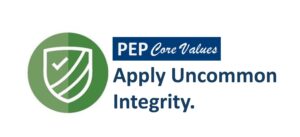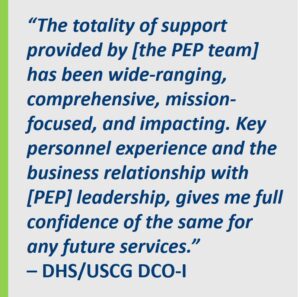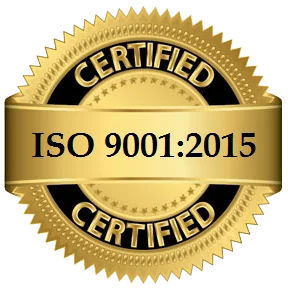
In an international survey of nearly 5,000 board members, managers, and employees:
- 97% of respondents agreed that corporate integrity is important.
- Yet only 1 in 10 employees say they work in organizations with a strong ethical culture.
Below, Rachel Ramirez, CEO and President of Performance Excellence Partners (PEP), discusses this disconnect and explains how she strives to uphold her company’s Number One core value: Applying Uncommon Integrity.
As the founder of a woman-owned small business and award-winning government contractor, Rachel points to PEP’s core values as the foundation of the company’s corporate culture and the key to its on-going success.
 PEP Core Values
PEP Core Values
“Our core values are the beacons that keep us on course as we strive to provide exceptional service to our clients and to each other,” Rachel says. “They inspire us to do and be our best.”
As the survey cited above indicates, corporate integrity––adhering to ethical principles in professional conduct and business operations–– is a popular concept. But PEP went a step further, adding the word “uncommon.” This grew out of Rachel’s personal belief system and her philosophy that leading by example required more than the bare minimum. She wanted to hold her own company to a higher standard.
How do you “apply uncommon integrity” in your business?
At PEP it starts with leadership. Our corporate team is charged with modeling integrity to our staff and contractors. How? By valuing people––our employees, our partners, our clients––and making decisions based on what’s best for those people and for the projects we take on.
That’s a balancing act, for sure. What may be good for one may not be good for another. But baked into our idea of uncommon integrity is the recognition that one person’s needs are different than another person’s. We have to listen, really listen, to each person and make adjustments based on what they tell us. Whether they’re a federal client or a staff member, each deserves to be heard and accommodated. It really goes back to my favorite leadership word: “congruence.” We try to make everything work together, to create a system of collaboration by giving everyone the same respect and consideration.
Granted, we occasionally fall short. Sometimes we have to make hard decisions. And managing a remote organization like ours adds its own unique challenges: employee engagement, keeping each other accountable, modeling behavior––all of these are more difficult. It’s easy to get way off base as we all work within our own silos.
How do you respond to these challenges?
It’s important to keep the lines of communication open and monitor our own behavior. Tami Berg, PEP HR Administrator, adds, “Maintaining integrity in our remote workforce means more than just ensuring HR compliance and enforcing policy and guidelines; it’s about staying connected. Touching base with remote employees isn’t just a courtesy—it’s a commitment to ensuring they feel valued, supported, and part of the team.”
Some good habits we’ve acquired:
- Regular leadership and all-staff meetings.
- Encouraging feedback.
- Keeping each other accountable.
- Emphasizing transparency.
- Frequent self-assessments.
And, of course, Core Value Number One is our guiding light.
The fact that PEP is a small company is also helpful––even though it can be a challenge to stay competitive. In a small business, problems are more visible, but our scale makes us more agile. We can be more flexible. We can change direction when necessary and develop creative solutions to address issues more quickly.
How do you measure integrity?
Business relationships are an important measuring stick for integrity. This includes relationships with employees, customers, vendors, and other business partners.

For our customers and partners, it’s going the extra mile to make sure we are delivering quality services tailored to best support their goals and objectives. If and when there is an issue, we address it. We listen and are flexible to develop solutions and do everything in our power to make it right. We also make it a point to form business relationships with other companies that share our same values. A company is most likely bringing integrity to its relationships if it can boast a loyal client base and partners who return again and again to collaborate. At PEP, I think that our repeat business, consistently high-performance evaluations (CPARS), and frequent contract extensions are all good indicators of our uncommon integrity in this area.
A business with integrity also treats its employees with respect and compassion, supports a work-life balance, recognizes hard work, and appreciates loyalty. We prioritize all of this at PEP, and that’s made clear right from the start. Our onboarding demonstrates how much we value those who work for us and with us. At the same time, we lay out our expectations right up front. We maintain high standards whether hiring or partnering, and we look for people who share our core values, which means we get good team members. “We proactively screen for fit, recruiting candidates who not only meet our clients’ key skills and qualifications, but who also have the right attitudes, work style, and ways of doing business that will work well within the client’s organization as well as share our core values,” explains Carrie Thorne, PEP Talent Acquisition Lead. In addition, the diversity of our staff is a strength that provides us with a broad range of talents and perspectives yielding proven results for our customers. All of this, in turn, makes our business relationships even stronger.
Watch for upcoming articles about PEP’s other core values: Seeking Inspired Solutions, Creating Lasting Impact, Attracting and Building Enduring Partnerships.
To Learn More: about PEP and our experience as a federal contractor visit our Services page or contact us. To be the first to receive our next blog post, please join our mailing list. You can download a copy of the PDF here.
####





